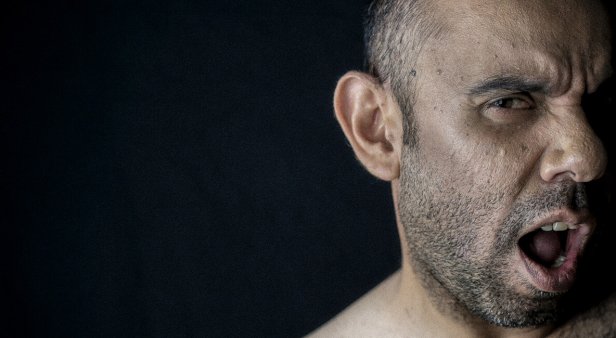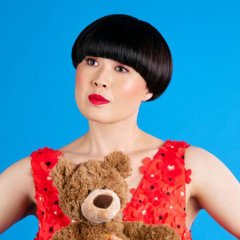You’ve been referred to as a quintuple threat – an actor, writer, singer, dancer and a comedian. It’s an impressive list of talents, but I’d love to know which one of the five came first.
Oh, I think the closest thing would be if you put them all together under ‘entertaining’. I guess I’ve always been a performer. If we are going way, way back I think the earliest memories of performing would be at family gatherings, where my family would always get me to dance when I was about five years old! (laughs)
So like a trial by fire, almost?
Basically, yeah. (laughs) I remember times when I’d be asleep and my parents would wake me up and ask me to dance for people! That would be my earliest memory of performing – doing stuff like that.
When you were growing up did you ever entertain the idea of performing professionally?
I think growing up in Cloncurry and Townsville I never really thought of it as a career opportunity. I’d studied theatre, which I think I failed in high school! (laughs) Even with English and becoming a writer I only ever got a sound in English and my only memory of my writing in high school was when a history teacher had told me that an assignment of mine had a lot of ‘good imagination’. Mum tried to get me to do dancing, and I was a part of a talent group up there, but there was a lot of stigma about being a boy and dancing that made me stay away from it.
Was there a point that you realised that it was your passion and that you could take it further?
I had finished high school I wasn’t really sure about what I wanted to do. Then I heard on the radio that there was an original music training program open in Perth and that if you thought you could sing, dance or act you should try out for it. I tried out for that and got in –I was meant to be in Perth for only six months but ended up staying for two-and-a-half years.
How did your career take shape after learning your craft?
Funnily enough when I came back from Perth I was in Townsville for three months and the guy who had started the Aboriginal Music Theatre training program in Perth was starting it up in Brisbane so he asked me to be a teacher and assistant artistic director of the school. That was my move to Brisbane in 1998.
Many of our readers would be familiar with your work through Black Comedy, how did you come to be involved in the show?
I was working for Aboriginal and Torres Strait Islander legal service and I got an e-mail through the network seeking Aboriginal and Torres Strait Islander people who thought they were funny. I thought I was idiotic enough (laughs) so I sent through some stuff and they liked it. The rest is history!
Had you had much experience in the realm of comedy up until that point?
Not really, I always did things that I knew would make people laugh and was funny but that was more down to be being an idiot. I‘ve got this whole collection of stories about Aboriginal and Torres Strait Islander people that have happened to me over the years that I’d tell at friends places and stuff, and some of them that worked in government organisations would tell me that they have a dinner or an award ceremony happening and I should get up and tell a story. It was kind of stand up comedy, but it was just stories and experiences from my life. People were reacting well to that, so I suppose that was my foray into comedy in a way.
When you first started working on Black Comedy, at what point did you realise you were working on something special and it was being well received?
I had a bit of a freak-out moment to tell you the truth! People were paying me compliments and they were telling me I was going to be famous and I had a bit of a panic attack. I still do to this day when people give me compliments and I try to work out why. For example, when I went to the Logies and I’m walking on the red carpet, the photos are flashing and Delta Goodrem is standing there with Richard Wilkins and the first thought that entered my brain was, “I’m basically here because I’m a dickhead”. (laughs)
How are you coping with it after season two?
Well I wanted to make sure that I wasn’t always seen in the light of being a comedian, which is why I would always do my poetry as well. I’m still learning about the whole process. There’s still so much that I want to do – I want to end up being a director, but there’s still so much to learn about the process. One good thing about being so fresh in the industry is that there’s so much for me to understand and try.
You are also a pretty respected poet, which sits in contrast to the comedic acting that people are familiar with. How did that start?
Well, I always thought my poetry was too simplistic so I never really did much with it. I went to a poetry event at the State Library of Queensland five years ago and I posted on Facebook that I was thinking about getting up and doing one of my poems. When I got there mates of mine had got there and entered me already! I ended up coming third that night and the next time I got up was the first time I did ‘Hate He Said’ and I won that night and it took off from there.
I’m curious about the topics that you touch on and how they are delivered differently between comedy and poetry. Black Comedy touches on a lot of issues but uses humour to communicate, while your poetry is more upfront in its intent. What do you think is the benefit of using humour to talk about issues close to your heart as opposed to the direct approach of poetry?
It’s funny, sometimes when you want to get something across its helpful to express it in a different way. Different people react to different things, but when I write something I know within the first couple of lines what it is going to be. I’ll start thinking about something and then a line will come from somewhere and I start with that. With the sketch comedy it’s about making people laugh but it’s about the message as well. There’s the humour there and it’s easier to take in, but with poetry I try to put the shoe on the other foot. I’m then trying to get people thinking about what I’m trying to say or how can I get them to see my message. What I love is when people say that I’ve made them think about issues in a way they’d never considered before.
Yeah, a lot of your poems read similarly to conversations you’ve already had with someone about an issue.
The thing about poetry is when it has a rhythm to it it becomes a soothing thing. I’m a big believer in this ‘life is rhythm’ thing – being a tap dancer and stuff. I believe that when you are speaking to someone and you do it in a voice and it’s like listening to a song it helps. I wrote a rap the other day, can you believe? It became this driving thing and it was exciting to go down that path.
We’re excited to catch your talk at the MELT Festival! Seeing as most encounters with you in a live setting are through comedic or theatrical performances, what can audiences expect from this candid format?
I don’t even know what I can expect! (laughs) Paul and me have never met so I’m not sure where we’ll end up. I think people want to have a bit more of an insight to me, I guess. One saying I love is ‘I’m also made up of the days you don’t see, not just the days you do’. I think that’s one of the things I struggled with when it came to the fame thing is that I was this ‘idea’ to people and in a way I tried to resist against it. As everyday people we are complex beings, there is a complexity to us. I think what people can expect is just a glimpse of that.
What do you think is the best thing about MELT Festival as a whole?
Well I just think that it is much needed because it is a different voice. The reason why I chose to stay in Brisbane and not move to Sydney was because these things need to happen in Brisbane. Queenslanders shouldn’t have to move interstate to make it in the industry, we need our own thing happening up here. It has been growing but it’s definitely something we need to foster.
What keeps you inspired and motivated in your work?
Oh, so many things! Learning. I don’t think you can ever stop learning. I think too often we take things as gospel, but we should constantly question. I’m constantly questioning myself to the point where I get mad sometimes but I’m finding the more I learn about myself the more I learn about others.
Catch Steven Oliver in conversation with Radio National’s Paul Barclay for MELT Talks at 3:00 pm on Sunday January 29.

